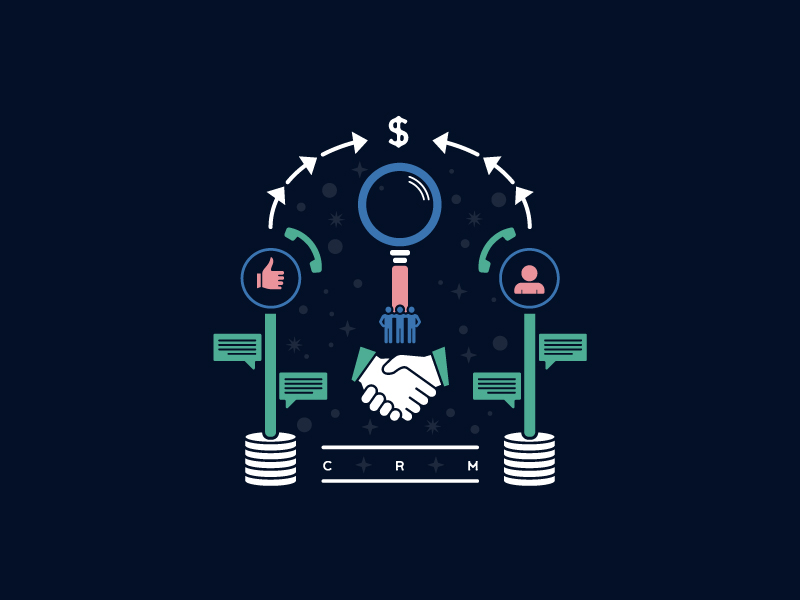When it comes to your marketing efforts, you’re collecting a lot of important customer data and prospect information. We’ve talked to countless businesses who are trying to keep everything in order through a Google spreadsheet or their MailChimp accounts. While this may work for a while, it is not a long-term solution (believe us, we know).
Enter the CRM: the customer relationship management tool that just happens to be the perfect place to keep important data like lead information, lead behavior, sales funnel activities, MQLs and SQLs, client information and activity and more. This is usually data that you’ll want your entire team to have access to so Sales can track their leads and Marketing can track conversions and clients.
We’ve mentioned before that automation tools are just tools without the correct strategy. So, today we’re going to talk about how Marketing benefits from using a CRM tool and the strategy that can be used with these benefits.
Why Marketing Should Use a CRM Tool
A CRM tool gives your company a centralized data repository that allows anybody with access to both pull out and add information they need. It’s likely that your Sales team is already using one but they’re not the only ones who can benefit from what the CRM has to offer. Marketing, too, can get, track, and utilize information and metrics that your CRM provides to help increase lead flow, conversion rate, and improve customer service.
Sound too good to be true? It’s not and here are 8 reasons why:
1. Centralize All of Your Customer Information
A CRM tool allows you to store all of the customer and prospect data that you’ve collected as well as track every interaction that you’ve had with customers and prospects. This is a much more efficient alternative to your sales team having to spend valuable time looking through their inbox for a prospect’s email or phone number. A CRM tool allows you to instantly find and access the information you need on customers and prospects.
For Marketers, once a prospect becomes a lead and then becomes a client, the CRM can then become a place where SOWs, meeting notes, updates, and ongoing conversations are stored for easy look up and understanding. When Marketing uses the CRM in this way, anyone on the team can hop into a client and know what’s happening and why.
Things we keep in our CRM:
- Proposals/SOWs
- Weekly notes
- Call notes
- Conflicts– was a deadline missed or pushed back? Why? How did we solve it?
- Changes in service or upsells
- Hours allocations and budget
- Team members working on the client and who does what
- Information about the client that will be helpful or useful to optimize customer service (ex: Jon would rather you email him on Tuesdays, Rhonda prefers texts to phone calls, Adam’s cat just died, his name was Fluffers and he’s pretty bummed about it).
No detail is too small for a great marketer–it’s all information we can use to not only provide the best communication and customer service, but it helps us build more specific and detailed personas for future prospects.
2. Improve Organization-Wide Communication
The use of a CRM tool improves communication across departments significantly. CRM tools automatically store communication, such as emails, phone calls, and calendar details. You can make this information accessible to multiple teams, including sales, marketing, and service departments. By allowing this open flow of communication company-wide, each team can share valuable information about prospects, customers, and strategies.
3. Automated Alerts Allow Immediate Action
The last thing you want to do is let high-quality prospects slip through your fingers, especially after you’ve invested so many resources into attracting them. CRM tools allow you to set up automated alerts for whenever a prospect takes a certain action. For example, if someone signs up for a newsletter, you can set up an alert to ensure that someone contacts them within an appropriate amount of time. The same can be done if someone signs up for a free trial –you can make sure the right person knows to call that prospect to ask how their trial is going and to nurture them towards purchasing the full product.
Marketing can use this information to help fully define a good lead vs. a bad lead, an MQL vs. an SQL, and determine the effectiveness of their marketing efforts. If you’re getting a lot of low-quality leads then you know something amiss in your current strategy. Marketing can use the CRM’s information to create better strategies and better leads.
4. Segmenting Your Leads
We’ve mentioned Smarketing before, Salers and Marketing should be working together to help nurture leads and bring more qualified traffic to the site. One way that Sales and Marketing can share valuable information? The CRM.
Because a CRM tool collects all available information on a prospect, it’s easier to segment your leads based on things like industry, title, persona, and activity. For example, you could segment them by the products they’ve purchased, by whether they’ve made a repeat purchase, by the number of emails they’ve opened, by their social media activity, and much more. This kind of detailed segmentation makes it much easier to personalize your marketing efforts, which will lead to more success in terms of capturing more leads and closing more sales.
If Sales and Marketing both have access to this information, Marketing can make more effective sales enablement content as well as more informed decisions about new campaigns, products, services, and content. When Marketing understands who the leads are, they can create more effective materials to help sell more directly to your leads.
5. Improve the Ability To Analyze Customer Data
Because all of your customer and prospect data will be collected in one location, your analytical capabilities and reporting abilities will be much more accurate. Without CRM tools, many businesses end up with miscalculated data as a result of having all of their information spread out across multiple platforms. With more accurate analytics, you’ll be able to make more effective marketing decisions.
Marketing can start to see which leads are coming in from their Inbound efforts and which leads are coming in from Sales’ outbound efforts. Are these MQL (marketing qualified leads) closing more quickly? Are they closing more slowly? Do they have certain behavioral patterns in common that can be used to help shorten the sales cycle or identify gaps in current marketing efforts?
Marketing can utilize a CRM tool to not only analyze real data from real users, but they can also show the value of their campaigns by reporting on conversions and ROI.
6. Integrate With Other Systems
Most CRM tools can be integrated with other systems and platforms. For example, the best CRM tools will allow integration with Microsoft Outlook and Gmail. Obviously, these are no-brainers in terms of collecting customer and prospect information. But many CRM systems will also allow integration with social media platforms, such as LinkedIn, Facebook, and Twitter, Google Analytics, and several email marketing platforms, if the CRM doesn’t have its own.
Marketing is notorious for using ALL THE PLATFORMS, so having a CRM that integrates with these platforms and provides a single portal for action, means that everything is easier to manage, easier to track, and easier to optimize. Marketing can see how their MQLs interact with social content, form fills, blog posts, web pages, etc. and use that data to create smarter, more relevant campaigns and content.
7. Improve Your Customer Service
You will have a much easier time addressing the needs of your customers and prospects by having access to their entire interaction history. As mentioned in the first point, using your CRM to keep track of your client interactions means that your Marketing team can be more agile and provide better customer service. There is no longer a single point of failure if one team member is out, another can hop into the CRM, look at the data, and know how to answer questions or where the team is on a specific project or service.
8. Improve Upselling and Cross-Selling
Because you will have the sales history of all of your customers right at your fingertips, you can market certain products or services that are relevant to customers based on their purchase history. This can greatly improve your ability to upsell and cross-sell and it provides an easier way to find patterns and use that data to create better, smarter, and more compelling marketing materials.
CRM Tools Make Sense for Marketing
By creating a centralized “single source of truth”, opening up communications between teams, and making your team more data-driven, a CRM tool will revolutionize your company’s approach to marketing. As your company becomes more efficient and organized with the use of a CRM tool, you will be able to dedicate more time to things like understanding your target audience and running more personalized campaigns so you can win more deals.
Note, however, that not all CRMs are created equally. SalesForce, HubSpot, SharpSpring, Zoho, Acorn, etc…the list is vast and diverse with price tags from the reasonable to the exorbitant. Know what you need now and what you need 3 years from now. Understand the tools that make sense for you and do your homework before you pull the trigger on a new CRM tool. Don’t be afraid to ask questions, get demos, and get testimonials from current users of the tool you’re looking at. This CRM tool, after all, will be the foundation for all of the work you do so you want to make sure it’s what you want and need!
We’ve been through this process before! Let us know if you have any questions about how to find a better CRM tool for your team.
-FINAL(01-00)-White&Blue-01.svg)





